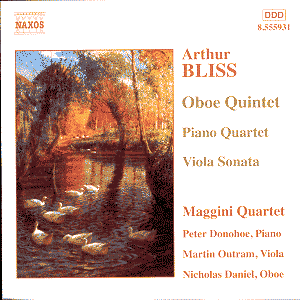Arthur Bliss has been
well served by Naxos in recent years,
from the superb state of the art discs
of his orchestral works, especially
Adam Zero and A Colour Symphony,
conducted by David Lloyd-Jones, through
the recent historical reissue of the
Piano Concerto, to the chamber
music, this disc being the second in
the latter series. It couples an early
work, the three movement Piano Quartet,
which is as steeped in the "English
pastoral tradition" of its day as the
lovely A major String Quartet
on Volume 1. Peter Donohoe's piano does
tend to add an extra dimension and,
as this listener laps up music of this
ilk anyway, I cannot recommend it highly
enough even though the greatest music
on the disc is elsewhere.
The Viola Sonata
was written for the great Lionel Tertis
and is a much more serious, bigger-boned
affair. It represents a formidable challenge
to the performers but here Maggini member
Martin Outram and his accompanist Julian
Rolton do it full justice. Although
the pastoral element has all but disappeared,
Bliss is always a composer concerned
with the lyrical and expressive; however,
for meditative and idyllic now read
turbulent and emotive. Great music but
also more demanding on the listener
than the work immediately preceding
it here. The tempestuous third movement
is a Furiant, an appellation
rarely seen this side of Prague, which
certainly lives up to its billing, with
an impassioned Coda bringing
the twenty five minute opus to a close.
The Oboe Quintet
is the best known and probably most
recorded piece here. As well as being
expertly written, not surprisingly for
Eugene Goossens, it has the unique distinction
of including a theme from an Irish dance
tune (Connelly's Jig) and
gaining the favour of Alban Berg when
the latter heard it in Vienna, following
its first performance at the 1927 Venice
Festival. The first movement begins
with a lyrical Assai sostenuto
before developing into a more energetic
agitato then dying away again.
The second movement is more pastoral
than anything in the sonata, yet still
more ambivalent than the early chamber
works. A lament-like section builds
to a climax then pizzicato strings
herald a faster, more rhythmic phase.
The aforementioned jig appears in the
driving final Vivace movement
but is much more fleeting than the similar
folk music theme in the equivalent movement
of Bax's Quintet, written five
years earlier. Nicholas Daniel and the
Magginis play the work faster than my
comparative version by the Audubon Quartet
and Pamela Pecha with the result being
a reading even more urgent and, for
its time, modern sounding. This disc
provides yet more evidence, if any were
needed, that the Maggini Quartet is
not only an incredibly talented group
but also that its members are thoroughly
attuned to British chamber music. A
must buy for British music enthusiasts
who must also be eagerly awaiting Peter
Donohoe's take on the Bliss Piano
Concerto.
Neil Horner
see also review
by Kevin Sutton [Recording
of the month]
